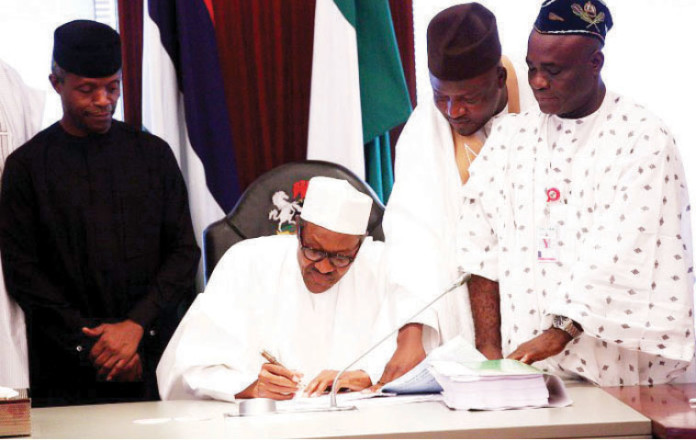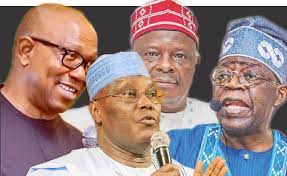After months of political intrigues between the Presidency and the National Assembly over the passage of the 2016 Appropriation bill reason finally prevailed on Friday as President Muhammadu Buhari assents to the document. But will the present economic hardship subside with the passage of the budget, writes Assistant Politics Editor, DANIEL KANU.
There was euphoria on the morning of Tuesday, December 22, 2015, when President Muhammadu Buhari, in person, presented a N6.08 trillion budget for the 2016 fiscal year before a joint session of the National Assembly in Abuja. Of course, the previous two budgets were presented on behalf of then President Goodluck Jonathan by the then Minister of Finance, Ngozi Okonjo-Iweala.
But all the ovation that greeted the 2016 Appropriation Bill presentation went dead with the padding controversy that followed. Buhari refused to sign a padded budget, and the lawmakers reveled in what the masses saw as selfish interests. And in what most political analysts saw as “ego show”, neither the National Assembly nor the Presidency was ready to shift ground.
From the rumour that the budget was missing, to padding, to refusal to attend to it by the Presidency, it has been a long story of endless waiting.
The result has been that of untold economic hardship on the people, making Nigerians to be apprehensive of the change they voted for under the party in power, the All Progressives Congress (APC).
Reason prevailed
Latest political development shows that reason has finally prevailed, as both parties struck a compromise on the issue on Thursday.
TheNiche gathered that after trading blames for weeks, the leadership of the National Assembly and the presidency met last week and resolved to end the budget impasse by constituting a reconciliation committee comprising members of the executive and the presidency.
“Having reached acceptable concession, all the grey areas have been resolved, and with the submission of the details of the budget and the two follow-up meetings, work was expected to be finalised on the budget details last night (Wednesday).
“Upon the completion of work, the budget details ought to be signed this week as it does not appear to be another delay in sight,” the source revealed.
Another source in the legislature revealed that the compromise reached was to retain the main underlining figures and parameters of the budget, but the executive gave some room to the National Assembly to alter, where necessary, up to 20 to 30 per cent of the budgets of federal Ministries, Departments and Agencies (MDAs).
The reason, according to the source, was in recognition of the independence of the legislature, with respect to appropriation, so that it does not end up being a rubber stamp of the executive.
Based on this principle, the source disclosed further that the joint committee of the National Assembly and the executive reviewed the subheads of the MDAs to ensure that where budget cuts or additions exceeded the 20 to 30 per cent threshold, they were amended in line with the agreement reached on the budget.
Although the source declined to provide insight into some of the major changes made in the budget by the reconciliation committee, it disclosed that with the resolution of the grey areas, the 2016 budget would meet the yearnings of Nigerians.
And Buhari signs budget
The President signed the delayed 2016 budget at the Presidential Villa on Friday with Vice President Yemi Osinbajo, Senate President Bukola Saraki, Speaker of the House of Representatives, Yakubu Dogara, and Finance Minister, Kemi Adeosun, among others as witnesses.
The record N6 trillion budget is expected to stimulate the nation’s slowing economy which took a hit as the price of crude oil, Nigeria’s main export, collapsed in the global market.
The Osinbajo leak
Osinbajo had confirmed that Buhari would assent to the 2016 budget soonest, likely last week.
He gave the assurance at a non-denominational conference by the Covenant Christian Centre in Abuja.
“The budget will become operational in the next few days,” Osinbajo had promised. “People now wonder: where is the change that formed the crux of our electioneering campaigns. But they fail to understand that patience is also a virtue that they must have as a people.”
Earlier apprehension
Before Buhari presented the budget, Nigerians were already agitated on his delay over very critical issues that would assist him to hit the ground running, considering that he took over in May 2015 and was unwilling to nominate his ministers.
Buhari even admitted that he was aware Nigerians were losing confidence in the government.
“But I promise the 2016 budget would address the problems,” the President said. “We are here to serve Nigeria and indeed Nigerians will get the services they have longed for.”
According to him, the budget would ensure reduction in taxes for small businesses.
While reiterating his commitment to economic diversification, he said farming and mining would be given special focus.
He also promised that 500,000 new teachers would be recruited, assuring that the Nigerian economy would cease to be oil-dependent and would instead be characterised by inclusive growth.
“We must deliver security, jobs and infrastructure,” Buhari had promised.
On the hardship been faced by Nigerians as a result of fuel scarcity, the President had apologised for the situation, admitting he was aware the scarcity had caused social dislocation across the country.
He blamed the scarcity on speculators and those “resisting change” and assured that government was working hard to cushion the difficulty.
On every sector, he made a firm promise that things would change for the better to improve the lives of the average citizen.
But critics have continued to pummel the Buhari administration as one that does not match promise with action.
The people’s verdict
Sylvan Ebigwei, President-General, Aka-Ikenga, intellectual think-tank of Ndigbo, was not expecting any magic from the passage of the budget. He said the conflict between both parties, which lingered for months, was unnecessary, urging the Buhari government to endeavour to put in place projects that would provide real transformation.
He had told TheNiche “I don’t think there will be any magic. What is a budget in the first place? It’s simply an intention or expression to spend money. Year in year out, budgets have been drawn, money appropriated; but usually there is nothing to show for it.
“So since we now have the slogan of change, let us hope that this change will bring the desired and genuine transformation that we as Nigerians need. Seeing is believing, let’s wait and see what the APC will give us. They have inundated us with so much promises, so much sweet talks. What Nigerians are waiting for now is its translation to reality, its ability to positively touch the lives of Nigerians.
“There has been so much needless brouhaha over the budget which I see more as ego trip. They should talk less and do more. The political class, I think, over-stepped their bounds by trying to introduce items, projects that were not there when the budget was presented to the National Assembly by the Presidency.
“The executive, perhaps knowing their right, felt that the National Assembly was trying to usurp the constitutional right of the executive and that has resulted to the confusion we witnessed.”
Former member representing Badagry Federal Constituency, Lagos State at the House of Representatives and APC stalwart, Idris Kosoko, said the passage of the budget would inject finance in the system, thereby boosting the economy.
For Ekiti State Governor, Ayodele Fayose, the delay was an indication that the government in power lacks focus, with no action to deliver. He described the 2016 Budget as confirmation that the APC and Buhari were never prepared for governance.
“If a government cannot prepare a common budget, it should just be concluded that those in the government never prepared for governance and such a government may not be able to achieve anything.”
Fayose said padding of the budget with strange figures, which was denied by ministers, was a clear intention to steal. “What those who prepared the budget did was to steal in advance. It is clear advance fraud and be it civil servants, political appointees or consultants, those responsible for this national embarrassment must be fished out and prosecuted.”
In a statement issued by his Special Assistant on Pubic Communications and New Media, Lere Olayinka, the governor had said: “There will be nothing special to expect from them, even when they pass the budget.”
Former Finance Minister, Kalu Idika Kalu, is more bordered on the security challenge in the land, saying that the budget or the economy would not amount to anything with insecurity in the land.
Said he: “Nothing can happen in the economy if there is insecurity. The ability of the economy to access resources either in terms of remittances, in terms of portfolio investment or direct investment. All of this impinge on the level of security.
“And we should not presume to discuss anything without re-emphasising the primary function of government: to secure the economy, secure lives and property, and see to the welfare of the people, among other commitments. Look at what is happening: there is oil theft, leakages across the porous borders in the North, East and West, perhaps everywhere. We must secure our environment, secure our plants, the refineries, power stations etc. No economy grows in a state of insecurity because all economic indicators are affected.”
Last line
The budget having been passed, political commentators say Buhari must hit the ground running as what obtains at the moment is not satisfactory.














